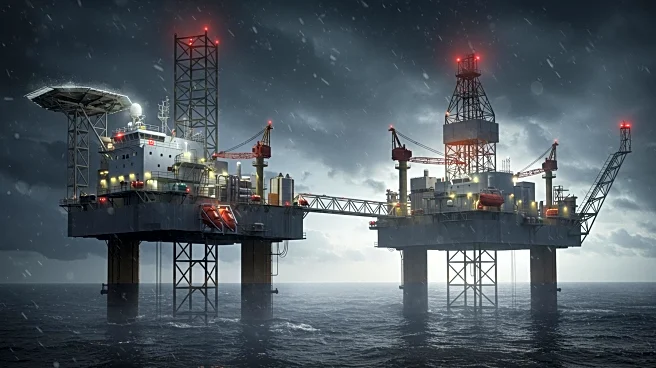What's Happening?
The Piper Alpha disaster, which occurred on July 6, 1988, remains the world's worst offshore oil and gas accident. Operated by the UK arm of Occidental Petroleum, the platform was located in the North Sea and was responsible for a significant portion of the region's oil production. The disaster was triggered by a gas leak from pipes connected to a pump, where a safety valve had been removed for maintenance. A communication failure led to the pressurization of the pipe, causing a gas leak that ignited and resulted in a catastrophic explosion. The ensuing fire and structural collapse led to the deaths of 167 men, including two rescuers, out of the 226 on board. The incident highlighted severe safety and management failures within the company and the broader industry.
Why It's Important?
The Piper Alpha disaster had profound implications for the oil and gas industry, particularly in terms of safety regulations and management practices. The official inquiry, led by Lord Cullen, resulted in 106 recommendations aimed at improving safety standards and oversight in the industry. These recommendations have since been instrumental in shaping the safety culture within the UK oil and gas sector, leading to significant reforms. The disaster underscored the critical importance of effective communication, safety protocols, and emergency response strategies in preventing similar tragedies. It also highlighted the need for robust regulatory frameworks to ensure the safety of offshore workers, influencing policies not only in the UK but also in other oil-producing regions worldwide.
What's Next?
In the aftermath of the Piper Alpha disaster, the oil and gas industry has seen a shift towards more stringent safety measures and regulatory oversight. The recommendations from the Cullen report continue to influence safety practices, with ongoing efforts to enhance risk management and emergency preparedness. The industry is likely to face continued scrutiny from regulatory bodies and the public to maintain high safety standards. Additionally, there may be further technological advancements aimed at improving safety and operational efficiency in offshore drilling. The legacy of Piper Alpha serves as a constant reminder of the potential risks associated with oil and gas extraction and the necessity for continuous improvement in safety practices.
Beyond the Headlines
The Piper Alpha disaster also had a significant cultural impact, particularly on the families of the victims and the communities involved in the oil and gas industry. It brought to light the human cost of industrial accidents and the need for corporate accountability. The disaster has been memorialized in various forms, serving as a poignant reminder of the lives lost and the importance of safety in industrial operations. It has also inspired individuals, like Shane Gorman, who lost his father in the disaster, to pursue careers focused on improving safety standards in the industry. The event continues to influence discussions around corporate responsibility and the ethical dimensions of industrial safety.









